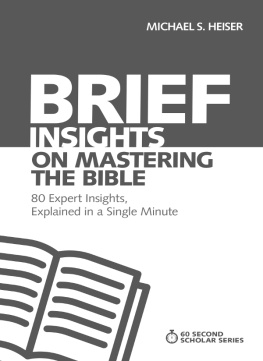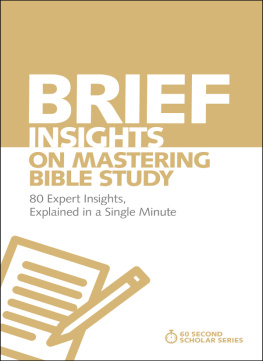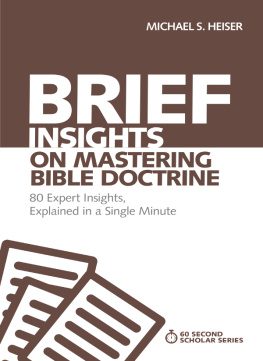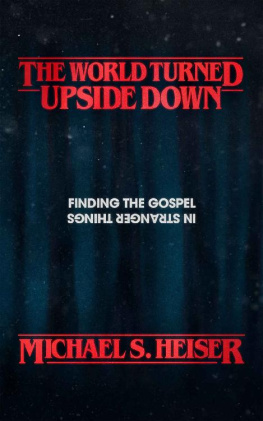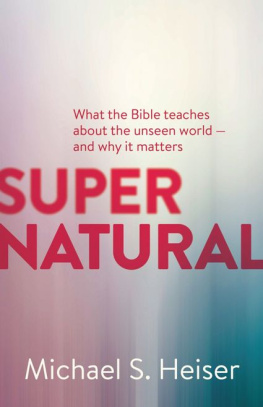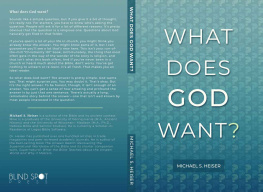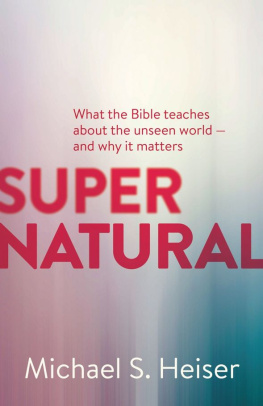Heiser Michael S. - The Bible Unfiltered
Here you can read online Heiser Michael S. - The Bible Unfiltered full text of the book (entire story) in english for free. Download pdf and epub, get meaning, cover and reviews about this ebook. year: 2017, publisher: Bellingham, WA, genre: Religion. Description of the work, (preface) as well as reviews are available. Best literature library LitArk.com created for fans of good reading and offers a wide selection of genres:
Romance novel
Science fiction
Adventure
Detective
Science
History
Home and family
Prose
Art
Politics
Computer
Non-fiction
Religion
Business
Children
Humor
Choose a favorite category and find really read worthwhile books. Enjoy immersion in the world of imagination, feel the emotions of the characters or learn something new for yourself, make an fascinating discovery.
- Book:The Bible Unfiltered
- Author:
- Publisher:Bellingham, WA
- Genre:
- Year:2017
- Rating:3 / 5
- Favourites:Add to favourites
- Your mark:
- 60
- 1
- 2
- 3
- 4
- 5
The Bible Unfiltered: summary, description and annotation
We offer to read an annotation, description, summary or preface (depends on what the author of the book "The Bible Unfiltered" wrote himself). If you haven't found the necessary information about the book — write in the comments, we will try to find it.
The Bible Unfiltered — read online for free the complete book (whole text) full work
Below is the text of the book, divided by pages. System saving the place of the last page read, allows you to conveniently read the book "The Bible Unfiltered" online for free, without having to search again every time where you left off. Put a bookmark, and you can go to the page where you finished reading at any time.
Font size:
Interval:
Bookmark:

The Bible Unfiltered
Approaching Scripture on Its Own Terms
Michael S. Heiser

The Bible Unfiltered: Approaching Scripture on Its Own Terms
Copyright 2017 Lexham Press
Some material adapted with permission from content originally published in Bible Study Magazine .
Lexham Press, 1313 Commercial St., Bellingham, WA 98225
LexhamPress.com
All rights reserved. You may use brief quotations from this resource in presentations, articles, and books. For all other uses, please write Lexham Press for permission. Email us at .
Unless otherwise noted, Scripture quotations are from The Holy Bible, English Standard Version ( ESV ), copyright 2016 by Crossway Bibles, a division of Good News Publishers. Used by permission. All rights reserved.
Scripture quotations marked ( LEB ) are from the Lexham English Bible, copyright 2013 by Lexham Press. Lexham is a registered trademark of Faithlife Corporation.
Print ISBN 9781683590408
Digital ISBN 9781683590415
Lexham Editorial Team: Douglas Mangum and Danielle Thevenaz
Cover Design: Brittany Schrock
For all my faithful Naked Bible Podcast listeners
Contents
Three years have passed since Lexham Press first decided to compile some of my Bible Study Magazine articles for publication as a book. The result was I Dare You Not to Bore Me with the Bible . In the introduction to that book I made the assertion that truly understanding much of the Bible requires seeing it in its original context, not filtering it through a familiar tradition.
When we write or speak with the intention of being understood, we naturally consider our audience. Whether were speaking to a toddler, writing an email to a parent, evaluating an employee, or clearing up a misunderstanding with a friend, we use vocabulary, style, and illustrative phrases drawn from common experiences, mutual intellectual perceptions, and familiar social situations. If we did not, we would have no right to expect to be understood. In fact, we would be misunderstood, perhaps quite disastrously. Our words derive from, and are shaped by, these factors. In other words, we understand each other to the extent that we share lifeor, to put it less elegantly in a way only scholars can manage, to the extent that we share a cognitive framework.
The sort of connection between a writer and a reader that produces successful communicationwith success being defined as the writers intended thoughts being well comprehended by the readercannot occur without shared worldview and outlook. The biblical writers wanted to be understood. They did not write with the intention of miscommunicating. More fundamentally, God wanted his thoughts, character, and purposes grasped with clarity. He prepared and chose men to accomplish that task, not to insert obstacles to that task. This means that those of us living thousands of years after the words of Scripture were written face a predicament. We come from a different world. We did not share life with them. We are not of one mind in a multitude of ways.
The hard work of translation has made it possible to read the words of the biblical writers. But communication involves far more than taking words of one language and converting them into the words of another. Sharing outlook and worldviewlife as it weremakes those words comprehensible. I can tell a Chinese friend that abortion is a hot potato in America, but hell never know what I mean by merely knowing the words hot and potato in English. This idiomatic expression can only be understood by experience within American culture or plenty of exposure to Americans. In another conversation my words may be intended to be understood metaphorically. I might refer to some object or concept whose symbolic, iconic meaning is what I wanted him to catch so that I might be understood. He needs me living in his head (that is, he needs to understand my worldview) to really fathom what Im talking about.
Its true that some things in Scriptureoften very important events and ideasare communicated with simplicity and in ways that transcend this chronological chasm. But the reverse is also true. Many passages in Scripture are quite perplexing. More troubling is the fact that a good number of our traditional, presumed understandings do not align with what the writer likely intended at all. The correct response to this is not despair. While we cant understand everything in Scripture with perfect precision, we can understand a great deal once we connect to the worldview and outlook of the writers. It would be absurd to conclude that since its impossible to achieve exhaustive comprehension of the Bible we shouldnt study it. Since you cannot know that everything you eat is entirely optimal for what your body needs at any given point should you stop eating?
We are blessed to have access to more information that connects us to the contexts of the biblical writers than ever before. My goal as a scholar is not only to alert you to the need for getting connected to those contexts, but to give you a head start. My prayer is that The Bible Unfiltered will do just that.
Michael S. Heiser
Bellingham, WA
One of my favorite scholarly quotations about the hard work of seriously engaging the biblical textwhat we popularly call Bible studyis that of the renowned Greek lexicographer, Frederick W. Danker (the D in BDAG ). Danker famously said that scholars tasks are not for sissies. He was right, and Im grateful he was willing to say what needed to be said.
The truth about serious Bible study is that it isnt easy. It takes sustained time and effort, often measured in days, weeks, and months, to really grasp what a passage means (or probably means) and why. If Bible study doesnt seem like work to you, you arent really doing it.
I realize that saying serious Bible study is work takes the pleasure out of it for some people. But presuming that you have to choose between enjoying the study of Scripture and attaining a more advanced grasp of it is a fallacy. People who are really good at anything or have a deep comprehension of a subject enjoy their mastery because they put in the work. Whether its mastering an instrument, becoming a chef, or fielding countless ground balls in practice, people at the top of any given field only reached that station after thousands of hours of effort. People who make those sorts of sacrifices when it comes to the study of Scripture have counted the cost. They decided that the exertion wasnt going to deter them. They werent sissies.
Do you really want to know more about Scripture than satisfies most? Do you really want a deep comprehension of this thing we call the word of God? If you do, here are some points of advice.
The goal of Bible study isnt to get a spiritual buzz
First, lets get the obvious out of the way. Any student of Scripture who really believes the Bible is Gods message to humanity will be emotionally moved from time to time at the wonder of why and how God maintains a loving interest in us. Thats normal for someone who really understands the spiritual implications of Scripture. So Im not suggesting emotional responses are antithetical to serious engagement with the Bible. What I am suggesting, though, is that if youre doing Bible study to feel a particular way, or get some spiritual high, then your Bible study is too self-focused.
Nowhere are we taught in the Bible to search the Scriptures to feel a certain way. Ultimately, Scripture is about Godwhat he did, what he is doing, and what he will donot about you. Youll never appreciate
Font size:
Interval:
Bookmark:
Similar books «The Bible Unfiltered»
Look at similar books to The Bible Unfiltered. We have selected literature similar in name and meaning in the hope of providing readers with more options to find new, interesting, not yet read works.
Discussion, reviews of the book The Bible Unfiltered and just readers' own opinions. Leave your comments, write what you think about the work, its meaning or the main characters. Specify what exactly you liked and what you didn't like, and why you think so.




